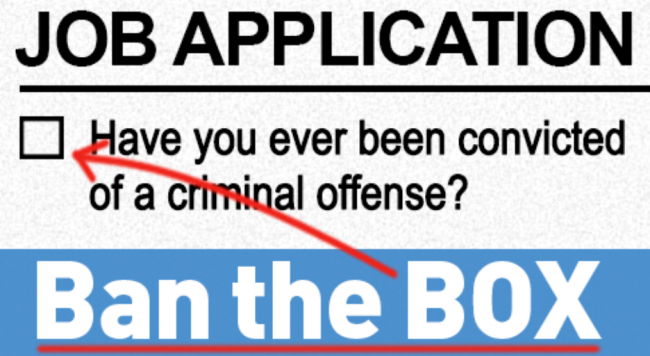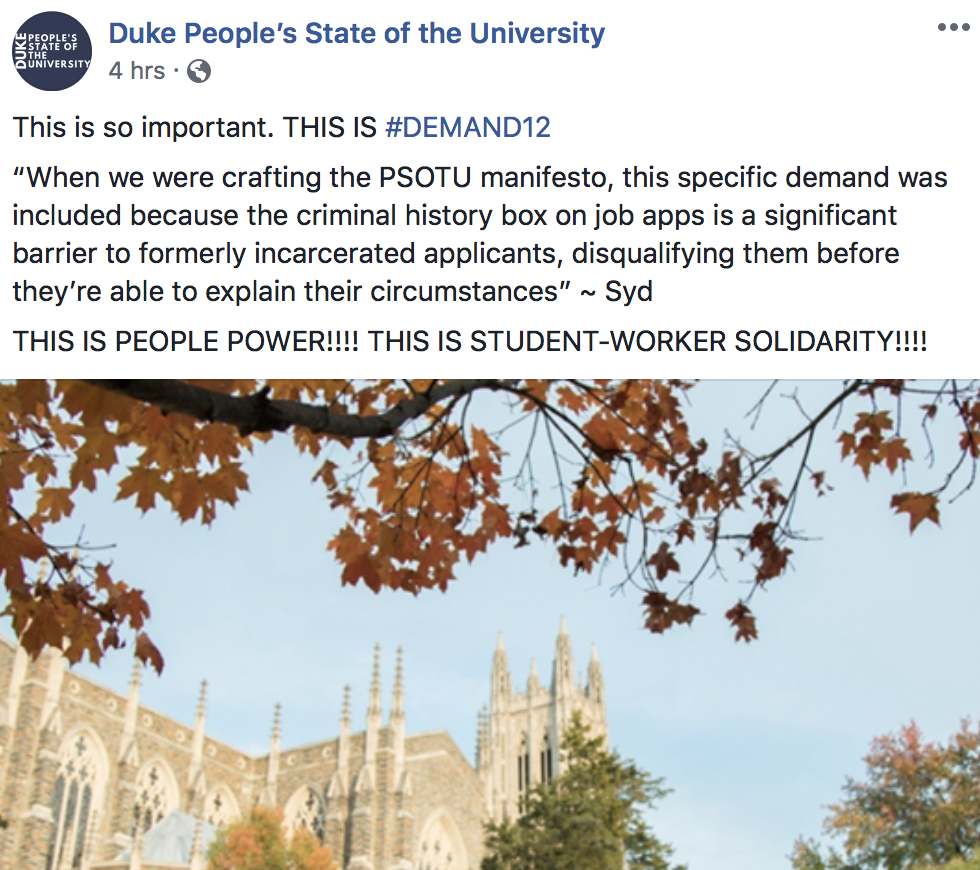You have /5 articles left.
Sign up for a free account or log in.

American Civil Liberties Union
Duke University will no longer ask job applicants about their criminal histories, it announced Tuesday.
The move comes as groups across the country push “ban the box” initiatives, saying that job applicants who check “yes” to questions about past convictions don’t get called back for interviews. That makes it harder for those who have served time or otherwise paid for their crimes to improve their lives, perpetuating a vicious cycle, advocates say.
Many states, cities and counties have ban-the-box laws prohibiting employers from asking initial applicants about their criminal histories. But no such laws apply to Duke, which is taking this step voluntarily.
"While responses to the question are not currently shared with hiring managers, asking for this information in an application can lead to a misperception among applicants that the responses are used to filter out those with a criminal record from employment opportunities at Duke," Kyle Cavanaugh, vice president for administration, said in a statement.
In an interview, Cavanaugh said that Duke has been updating its hiring policies over the past several years, including by making background checks mandatory for all employees, including faculty members. That change represents another national trend, triggered in part by the Jerry Sandusky case at Pennsylvania State University.
Of ban the box, Cavanaugh said Duke students have been promoting it. In particular, a group called People’s State of the University last year included such a provision in a list of 12 social justice-related demands of the campus administration. Asking applicants to disclose their criminal histories is an “unjust hiring practice,” the group said.
The group celebrated Duke's announcement on its Facebook page Tuesday.

Duke will continue to conduct background checks on criminal history, government sanctions and, if relevant, driving records at the conditional offer stage.
Cavanaugh said that if an applicant’s criminal history is discovered at that point in the hiring process, Duke will consider the crime’s “severity, recency -- was it something that happened many years ago, or was it something that happened very recently -- and, most importantly, job relatedness. Maybe if you’ve committed a crime that precludes you from getting a driver’s license, you couldn’t get a job that involved driving a bus. But it wouldn’t wipe you out of consideration for another position.”
Every person’s application will be assessed individually, he said. “We don’t have a bright line, we’ll be looking at it through that rubric.”
Duke’s new policy will take effect Nov. 1. It applies to all university and Duke University Health System employees -- about 40,000 people.
Even as more institutions ban the box, whether by law or voluntarily, many are also internally mulling what to do about employees found to have committed sexual misconduct. Findings from institutional investigations wouldn’t typically come up in a background check based on legal records, but colleges and universities are under increasing pressure not to “pass the harasser.” The University of Wisconsin System has even said that it will begin disclosing harassment findings against past employees during reference checks, through a central human resources office. System institutions also will share personnel files, including harassment findings, with one another.
Cavanaugh said Duke is not taking that step at this time. It will continue to run background checks on students, as well.
The trends toward ban the box and disclosure of harassment findings seem potentially incongruent. But many academic advocates of ban the box say that immediately weeding out candidates with past convictions of any kind can perpetuate structural inequality. By contrast, sexual harassment by staff and faculty members is an abuse of power by those who already hold it, they say.





